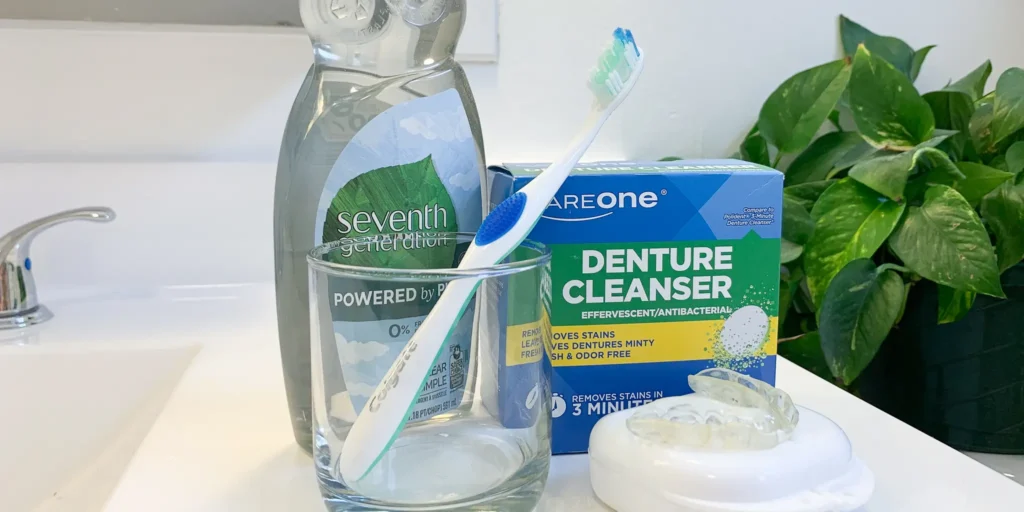Every night, millions of people wear night guards to protect their teeth from grinding or clenching during sleep. These dental appliances are invaluable for preventing enamel wear, jaw strain, and chronic headaches. But few people stop to think about what happens once the night guard comes out of their mouth in the morning.
If you rinse it quickly under water and toss it in a case, you’re not alone—but that simple rinse might not be doing enough. Studies show that mouthguards and night guards can harbor an astonishing variety of bacteria, fungi, and biofilm after just one use.
So the question is: how clean is your night guard really—and what’s actually living on it?
The Hidden Ecosystem of a Night Guard
Your mouth is home to hundreds of species of microorganisms—many harmless, some not. When you wear a night guard, those microbes find a warm, moist surface to cling to. During sleep, saliva flow decreases, and temperature rises slightly, creating ideal conditions for bacterial growth.
By morning, the inner surface of a night guard can contain:
- Streptococcus mutans (a key player in cavities)
- Candida albicans (a common yeast linked to oral thrush)
- Staphylococcus aureus (which can cause infections in vulnerable individuals)
- Layers of biofilm—sticky bacterial colonies that resist normal cleaning
What’s more surprising is how quickly these contaminants accumulate. Research published in the Journal of Dentistry found that biofilm can begin forming within hours and, if left unchecked, can persist even after rinsing.
Essentially, your night guard can become a tiny Petri dish that you reinsert into your mouth every night.
Why Simple Rinsing Isn’t Enough
Most people treat their night guards like their toothbrush—rinse, dry, and reuse. But while toothbrushes dry out between uses, night guards typically stay damp in closed containers, giving bacteria a better chance to thrive.
Even soaking in mouthwash or using soap and water can fail to eliminate biofilm entirely. Biofilm bacteria adhere tightly to surfaces, and once they mature, they develop a protective layer that resists most cleaning agents.
If the night guard isn’t properly sanitized, you may be reintroducing bacteria to your mouth daily. Over time, this can contribute to:
- Bad breath or an unpleasant taste
- Gum irritation and inflammation
- Mouth sores or allergic reactions
- Secondary infections, particularly for people with compromised immune systems
This makes cleaning your night guard as important as wearing it.
The Broader Health Connection
Poor dental appliance hygiene doesn’t just affect the mouth—it can influence overall health. Oral bacteria can enter the bloodstream through tiny abrasions in the gums, potentially contributing to systemic inflammation.
Researchers have linked chronic oral bacteria exposure to broader conditions like cardiovascular disease and respiratory infections. While the connection isn’t direct causation, it highlights a growing recognition: oral hygiene extends beyond brushing and flossing.
A neglected night guard can undermine even the best dental care routine.
The Rise of Smarter Cleaning Solutions
Traditional cleaning methods, like soaking in denture tablets or brushing with toothpaste, only remove surface debris. But modern hygiene standards are shifting toward deeper cleaning techniques—ones that target microscopic contaminants and biofilm.
Here’s where innovation steps in. Advanced cleaning devices now use soundwave technology to sanitize dental appliances more effectively than manual scrubbing or soaking alone.
An ultrasonic cleaner for night guard, for instance, works by emitting high-frequency vibrations in water, creating microscopic bubbles that implode against surfaces. This process, known as cavitation, breaks apart biofilm and removes contaminants even from crevices invisible to the naked eye.
The result isn’t just a cleaner-looking appliance—it’s one that’s truly disinfected on a microscopic level.
Common Myths About Night Guard Cleaning
Because cleaning habits are often learned informally, many misconceptions persist:
- Myth 1: Rinsing with mouthwash kills all bacteria.
Mouthwash can reduce bacteria but doesn’t penetrate biofilm or clean mechanical residue. - Myth 2: Toothpaste works fine for cleaning.
Abrasive toothpaste can scratch the guard’s surface, creating even more spots for bacteria to hide. - Myth 3: Denture cleaners are one-size-fits-all.
Some formulas may be too harsh for thermoplastic night guards, leading to warping or discoloration.
Effective care requires both the right cleaning method and the right frequency—ideally daily sanitization.
The Cost of Neglect
Beyond hygiene concerns, improper maintenance can shorten your night guard’s lifespan. Residue buildup can cause discoloration, odors, and a roughened surface, making the device uncomfortable and less effective.
A guard that’s cracked or warped can no longer provide the proper alignment or pressure distribution, potentially worsening the very issues it was meant to prevent.
Replacing a damaged guard can be costly, so preventive cleaning is both a health and financial investment.
A Better Cleaning Routine
A simple yet effective night guard care routine can make a world of difference.
Daily Routine:
- Rinse your night guard immediately after removal with lukewarm (not hot) water.
- Brush it gently with a soft toothbrush and mild, non-abrasive soap.
- Dry thoroughly before storing it in a ventilated case.
Weekly Deep Clean:
- Use a specialized cleaning tablet or solution designed for dental appliances.
- Incorporate ultrasonic cleaning to remove buildup and bacteria from microscopic crevices.
- Allow the guard to air dry completely before its next use.
Consistency, not just occasional effort, is the real secret to long-term oral appliance hygiene.
The Takeaway: Your Night Guard Deserves the Same Care You Give Your Teeth
It’s easy to think of your night guard as a passive accessory—something that just sits in your mouth and does its job. But it’s a living part of your oral ecosystem, constantly interacting with saliva, bacteria, and biofilm.
Neglecting it doesn’t just risk odors or stains—it can compromise oral health, comfort, and even sleep quality.
The good news is that a few mindful habits, combined with modern cleaning tools, can ensure that your night guard remains both protective and hygienic.
Because when it comes to oral health, what you put in your mouth every night deserves the same level of care as what you brush off every morning.



